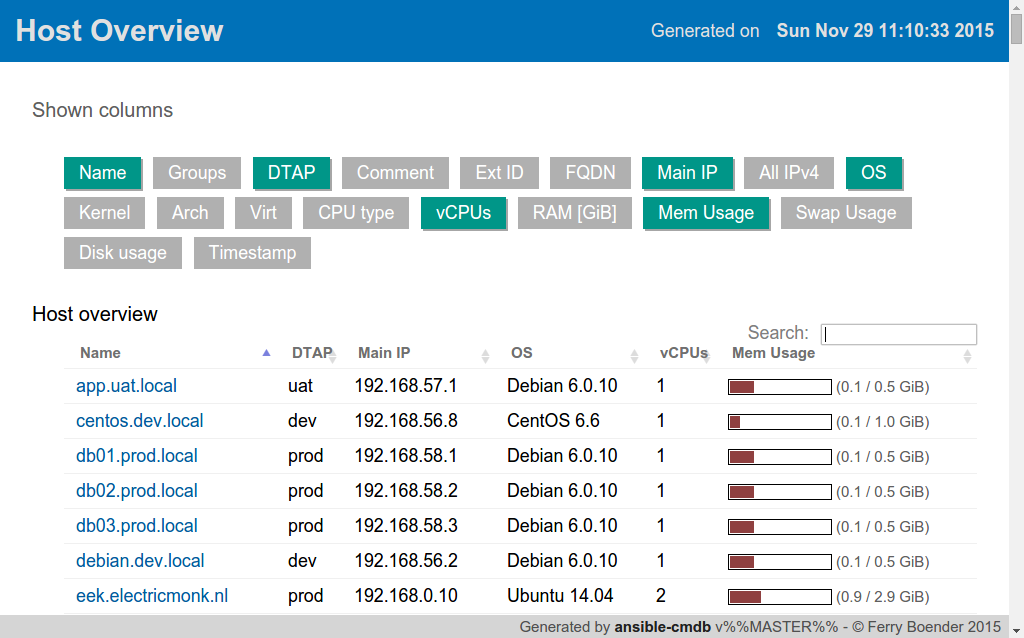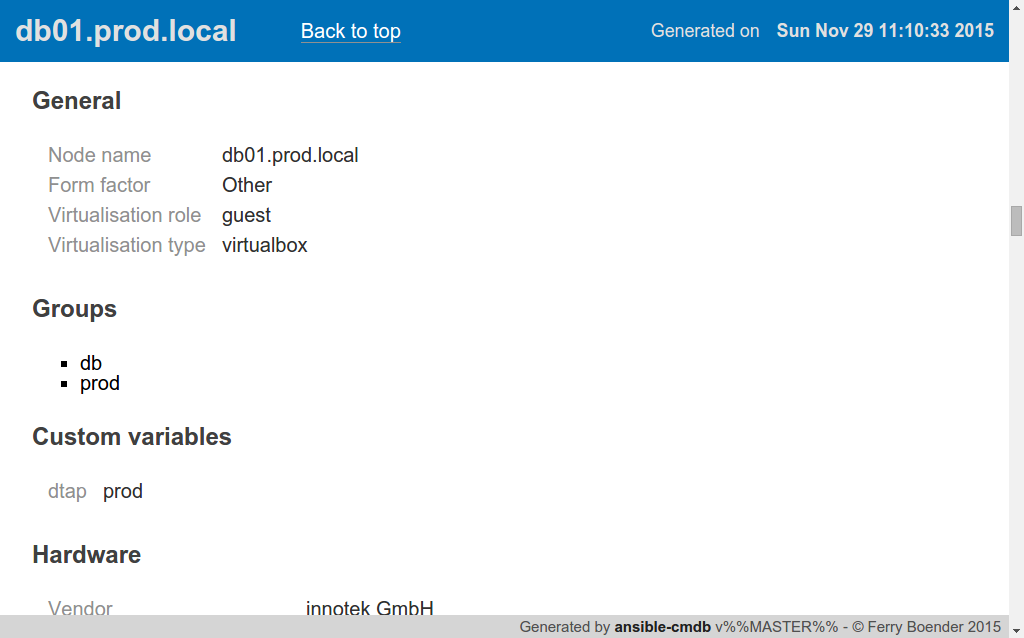Ansible-cmdb takes the output of Ansible's fact gathering and converts it into a static HTML overview page containing system configuration information.
It supports multiple templates and extending information gathered by Ansible with custom data.
HTML example output.
Get the package for your distribution from the Releases page (Not required for MacOS X install)
For Debian / Ubuntu systems:
sudo dpkg -i ansible-cmdb*.deb
For Redhat / Centos systems:
sudo yum install ansible-cmdb*.rpm
For MacOS X systems:
brew install ansible-cmdb
For Other systems:
tar -vxzf ansible-cmdb*.tar.gz
cd ansible-cmdb*
sudo make install
First, generate Ansible output for your hosts:
mkdir out
ansible -m setup --tree out/ all
Next, call ansible-cmdb on the resulting out/ directory to generate the CMDB
overview page:
ansible-cmdb out/ > overview.html
The default template is html_fancy, which uses jQuery.
Usage: ansible-cmdb [option] <dir> > output.html
Options:
--version show program's version number and exit
-h, --help show this help message and exit
-t TEMPLATE, --template=TEMPLATE
Template to use. Default is 'html_fancy'
-i INVENTORY, --inventory=INVENTORY
Inventory to read extra info from
-f, --fact-cache <dir> contains fact-cache files
-p PARAMS, --params=PARAMS
Params to send to template
-d, --debug Show debug output
-c COLUMNS, --columns=COLUMNS
Show only given columns
Ansible-cmdb can read your inventory file (hosts, by default), inventory
directory or dynamic inventory and extract useful information from it such as:
- All the groups a host belongs to.
- Host variables. These are optional key/value pairs for each host which can be used in playbooks. They are scanned by ansible-cmdb and get added to a hosts discovered facts under the 'hostvars' section.
Reading the inventory is done using the -i switch to ansible-cmdb. It takes
a single parameter: your hosts file, directory containing your hosts files or
path to your dynamic inventory script.
For example:
$ ansible-cmdb -i ./hosts out/ > overview.html
If a host_vars directory exists at that location, it will also be read.
The ''html_fancy'' template uses four extra fields:
groups: A list of Ansible groups the host belongs to.dtap: Whether a host is a development, test, acceptance or production system.comment: A comment for the host.ext_id: An external unique identifier for the host.
For example, let's say we have the following hosts file:
[cust.megacorp]
db1.dev.megacorp.com dtap=dev comment="Old database server"
db2.dev.megacorp.com dtap=dev comment="New database server"
test.megacorp.com dtap=test
acc.megacorp.com dtap=acc comment="24/7 support"
megacorp.com dtap=prod comment="Hosting by Foo" ext_id="SRV_10029"
[os.redhat]
megacorp.com
acc.megacorp.com
test.megacorp.com
db2.dev.megacorp.com
[os.debian]
db1.dev.megacorp.com
The host acc.megacorp.com will have groups 'cust.megacorp' and 'os.redhat',
will have a comment saying it has 24/7 support and will be marked as a acc
server. Megacorp.com host will have an external ID of "SRV_10029", which will
be required by for communicating with Foo company about hosting.
See http://docs.ansible.com/intro_inventory.html#host-variables for more information on host variables.
Any variables set for your hosts will become available in the html_fancy template under the "Custom variables" heading.
ansible-cmdb offers multiple templates. You can choose your template with the
-t or --template argument:
ansible-cmdb -t tpl_custom out/ > overview.html
The 'html_fancy' template is the default.
Ansible-cmdb currently provides the following templates out of the box:
-
html_fancy: A fancy HTML page that uses jQuery and DataTables to give you a searchable, sortable table overview of all hosts with detailed information just a click away.It takes a parameter
local_jswhich, if set, will load resources from the local disk instead of over the network. To enable it, call ansible-cmdb with:ansible-cmdb -t html_fancy -p local_js=1 out > overview.htmlIt can be easily extended by copying it and modifying the
colsdefinition at the top. -
txt_table: A quick text table summary of the available hosts with some minimal information. -
json: The json template simple dumps a JSON-encoded representation of the gathered information. This includes all the extra information scanned by ansible-cmdb such as groups, variables, custom information, etc.
You can create your own template or extend an existing one by copying it and
refering to the full path to the template when using the -t option:
$ ansible-cmdb -t /home/fboender/my_template out/ > my_template.html
Ansible can cache facts from hosts when running playbooks. This is configured in Ansible like:
[defaults]
fact_caching=jsonfile
fact_caching_connection = /path/to/facts/dir
You can use these cached facts as facts directories with ansible-cmdb by
specifying the -f (--fact-cache) option:
$ ansible-cmdb -f /path/to/facts/dir > overview.html
Please note that the --fact-cache option will apply to all fact directories
you specify. This means you can't mix fact-cache fact directories and normal
setup fact directories. Also, if you wish to manually extend facts (see the
Extending chapter), you must omit the ansible_facts key and put items in
the root of the JSON.
Some templates, such as txt_table and html_fancy, support columns. If a
template supports columns, you can use the --columns / -c command line
option to specify which columns to show.
The --columns takes a comma-separated list of columns (no spaces!) which
should be shown. The columns must be specified by their id field. For
information on what id fields are supported by a template, take a look in the
template. Usually it's the column title, but in lowercase and with spaces
replaced by underscores.
For example:
$ ansible-cmdb -t txt_table --columns name,os,ip,mem,cpus facts/
Name OS IP Mem CPUs
---------------------- ------------- ------------- --- -
jib.electricmonk.nl Linuxmint 17 192.168.0.3 16g 1
app.uat.local Debian 6.0.10 192.168.57.1 1g 1
eek.electricmonk.nl Ubuntu 14.04 192.168.0.10 3g 1
db01.prod.local Debian 6.0.10 192.168.58.1 0g 1
debian.dev.local Debian 6.0.10 192.168.56.2 1g 1
db02.prod.local Debian 6.0.10 192.168.58.2 0g 1
centos.dev.local CentOS 6.6 192.168.56.8 1g 1
win.dev.local Windows 2012 10.0.0.3 4g 0
host5.example.com Debian 6.0.10 192.168.57.1 1g 1
db03.prod.local Debian 6.0.10 192.168.58.3 0g 1
zoltar.electricmonk.nl Ubuntu 14.04 194.187.79.11 4g 2
You can specify multiple directories that need to be scanned for output. This lets you add more custom information to existing hosts or even completely new hosts.
For example, if your normal ansible setup output contains:
$ ls out/
db1.dev.megacorp.com
db2.dev.megacorp.com
test.megacorp.com
$ cat out/test.megacorp.com
{
"ansible_facts": {
"ansible_all_ipv4_addresses": [
"158.12.198.104"
],
--snip--
You can create an additional directory with custom information:
$ mkdir out_cust
$ cat out_cust/test.megacorp.com
{
"software": [
"Apache2",
"MySQL5.5"
]
}
Specify both directories when generating the output:
./ansible-cmdb out/ out_cust/ > overview.html
Your custom variables will be put in the root of the host information dictionary:
"test.megacorp.com": {
"ansible_facts": {
"ansible_all_ipv4_addresses": ["185.21.189.140"],
},
"changed": false,
"groups": ["cust.flusso"],
"software": [
"Apache2",
"MySQL5.5"
],
"name": "ad6.flusso.nl"
}
If you're using the --fact-cache option, you must omit the ansible_facts
key and put items in the root of the JSON. This also means that you can only
extend native ansible facts and not information read from the hosts file by
ansible-cmdb.
Ansible currently does not include disk size information for Solaris hosts. As such, we can't include it in the output of Ansible-cmdb. See issue #24 for more information.
Python has some of the most horrendous packaging infrastructure I've ever encountered in 25 years of programming. As such, anything related to Python packaging will not be supported.
If you want to run ansible-cmdb directly from the Git repo:
$ cd ansible-cmdb
$ export PYTHONPATH="$(readlink -f lib)"
$ src/ansible-cmdb
Here's a quick introduction on how ansible-cmdb works internally.
- The main section in
ansible-cmdbreads the commandline params and instantiates anAnsibleobject. - The
Ansibleobject first reads in all the facts by callingAnsible.parse_fact_dir()for each argument. This includes the user-extended facts. - If hosts file(s) should be parsed (
-ioption), ansible callsAnsible.parse_hosts_inventory(). This first reads in all found hosts files into one big string, and then it parses it. For this it uses theAnsibleHostParserclass. - The
AnsibleHostParserclass first parses the inventory and then creates a dictionary with all known ansible node names (hosts) as the keys, but with empty values. It then goes through the 'children', 'vars' and normal sections from the inventory and applies the found information to the hosts dictionary. - When
AnsibleHostParseris done, theAnsibleclass takes all the parsed hosts information and updates its own version of the hosts dictionary. - Finally, the output is generated by the main section.
Updating a host in the Ansible object is done using the Ansible.update_host
method. This method does a deep-update of a dictionary. This lets ansible-cmdb
overlay information from the facts dir, extended / manual facts and hosts
inventory files.
For building, make is used. Here are some useful targets:
make test: build some tests.make release: build a release.make clean: remove build and other artifacts.
To build Debian, RedHat and source-packages for ansible-cmdb you'll need a Debian based operating system and you'll have to install the following dependencies:
- git
- make
- python-markdown
- zip
- fakeroot
- alien
You can then build the packages with
make release REL_VERSION=$VERSION
where $VERSION is a (arbitrary) version number.
In order to build releases, your repository will have to be completely clean: everything must be commited and there must be no untracked files. If you want to build a test release, you can temporary stash your untracked changes:
git stash -u
If you wish to contribute code, please consider the following:
- Any form of Python packaging will NOT be supported. Merge requests involving python packages will not be considered. See issue #23.
- Thank you for even considering contributing. I'm quite newbie-friendly, so don't hesitate to ask for help!
- Code should be reasonably PEP8-like. I'm not too strict on this.
- One logical change per merge request.
- By putting in a merge request or putting code in comments, you automatically grant me permission to include this code in ansible-cmdb under the license (GPLv3) that ansible-cmdb uses.
- Please don't be disappointed or angry if your contributions end up unused. It's not that they aren't appreciated, but I can be somewhat strict when it comes to code quality, feature-creep, etc.
When in doubt, just open a pull-request and post a comment on what you're unclear of, and we'll figure it out.

